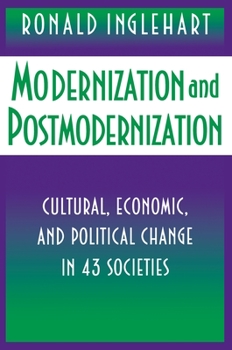Modernization and Postmodernization: Cultural, Economic, and Political Change in 43 Societies
Select Format
Select Condition 
Book Overview
Ronald Inglehart argues that economic development, cultural change, and political change go together in coherent and even, to some extent, predictable patterns. This is a controversial claim. It... This description may be from another edition of this product.
Format:Paperback
Language:English
ISBN:069101180X
ISBN13:9780691011806
Release Date:May 1997
Publisher:Princeton University Press
Length:464 Pages
Weight:1.55 lbs.
Dimensions:1.2" x 6.1" x 9.2"
Customer Reviews
2 ratings
Modernization Theory is Not a Dead Horse
Published by Thriftbooks.com User , 16 years ago
Modernization Theory holds that industrialization, and the subsequent economic development is linked with cultural, political, and economic changes. Additionally, Modernization Theory argues that these linkages and changes can and do form coherent and predictable patterns. However, one of the critiques of Modernization Theory has to do with causality. Both the Marxist and Weberian schools are in agreement with the basic premise that economic, political, and cultural change form coherent patterns, but diverge in regards to the catalysts of said change. The Marxist camp argues that economic and technological change drives political and social change, while the Weberian school postulates that cultural aspects drive economic and political change. Inglehart, however, suggests that the deterministic arguments posed by both the Marxists and Weberians are oversimplified. Rather, Inglehart argues that economic, political, and cultural variables are mutually dependent and intertwined. He writes, "if you know one component you can predict the other components with far better than random success" (331). Inglehart further critiques Modernization Theory for its emphasis on linearity. Rather than moving in one continuous direction, the author argues that there is a fundamental change in values and motivations, this being the shift to Postmodernization. With these two critiques, as well as rebuke of the supposed ethnocentricity of the theory, and the assumption that Modernization leads to democracy, Inglehart pursues a new model of economic, political, and cultural change which composes his Modernization and Postmodernization thesis. Inglehart argues that during the Modernization phase a society undergoes economic, cultural, and political changes. "Economic development is linked with a syndrome of changes that includes not only industrialization, but also urbanization, mass education, occupational specialization, bureaucratization, and communications development, which in turn are linked with still broader cultural, social, and political changes" (8). We see individuals moving away from status based on ascription, towards status based on achievement; we see a move towards rational-legal authority structures, etc. Additionally, during this time, individual values are based on achieving economic security and material gain. However, as Inglehart points out, advanced industrial societies eventually reach a level of marginal rate of return on economic growth. When a society reaches this threshold, we begin to see a fundamental change in values and institutional structures, or a move to a Postmodern Society. Inglehart writes, "Postmodernism is the rise in new values and lifestyles, with greater toleration for ethnic, cultural, and sexual diversity and individual choice concerning the kind of life one wants to lead" (23). In short, economic growth eventually reaches a point of marginal utility and accompanying value and motivational changes occur
best data on global change
Published by Thriftbooks.com User , 17 years ago
Ignore the only other review about this book, which is tremendously silly and obviously written from a right-wing perspective. It is not true that Inglehart opposes materialist and postmaterialist values against tradition: in fact he creates a multi-dimensional model in which the opposition between materialist and postmaterialist values make up one axis, while the opposition between traditional and secular-rational authority constitutes a separate axis. Thus, the US is situated in this model as a society whose people prioritize postmaterialist values but ALSO favor (more slightly) traditional over secular-rational forms of authority. This combination of postmaterialism and tradition seems to explain a lot about Americans today: they increasingly favor qualitative values like free expression, choice, and life satisfaction over quantitative values like money and technology, and yet they adhere more to traditional forms of authority like religion, the family, and nation while being distrustful of secular institutions and the government. Inglehart's thesis is that cultural, political, and economic changes cluster together and change in relatively predictable ways. Societies undergo tremendous changes as they modernize, industrialize, bureaucratize, urbanize, and so forth, but then they hit a point of diminishing returns when the survival of most people can be guaranteed and scarcity is no longer an issue. This is the point where people seek out postmaterialist values, because the search for more money leaves them existentially empty, and so they seek out more substantive forms of satisfaction and meaning. Perhaps this is the only common ground among Americans of the blue and red states: obviously they aren't simply voting in terms of economic self-interest (in which case their political affiliations would be reversed) but rather on the basis of cultural values: ecology and tolerance for the blue states, God and nation for the red states. Yes, Inglehart's politics are somewhat leftist, and he does argue that his data supports much of what Marx had to say about modernization, but above all he is a scientist and an empiricist who is most concerned with perfecting his techniques of measurement. That's why it's so ridiculous to dismiss him as politically biased as the previous reviewer and a number of other critics seem to do. The amount of data is this book is astounding. And yet it is still imminently readable, and unlike so much other social science, does not fetishize its methods of data analysis as an end in itself. The only reason to give this work 4 stars instead of 5 is that I think Inglehart has a hard time explaining the resurgence of fundamentalism that has swept through the world recently. He somewhat persuasively argues that Islamic fundamentalism has taken hold in societies that may be oil-rich but certainly aren't modernized, but when it comes to the US he maintains that religion is declining in influence and that the Christian right





